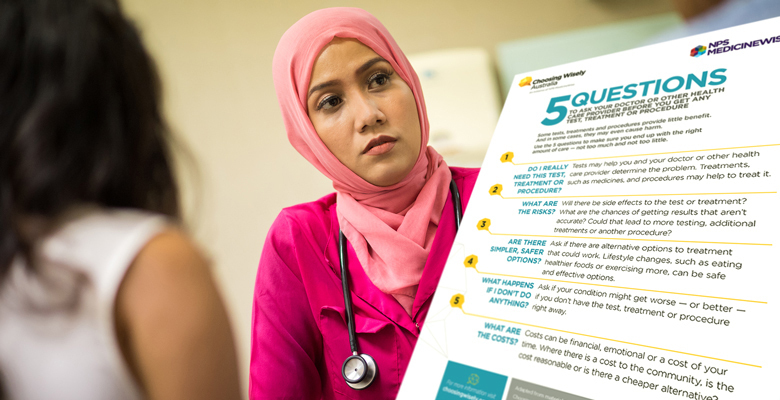Educational visit
Mental health and young people: opportunities to empower and engage
This program is designed to help GPs assess people aged 16–24 years who present with psychological distress, and discuss medicines and non-medicine management options for depression and anxiety disorders.
-
Start: 1 March 2022
-
Cost: free


The NPS MedicineWise program on heart failure has been developed in collaboration with the National Heart Foundation of Australia.
Accreditation
This activity is pending RACGP approval for 2 CPD activity points.
This activity is pending accreditation for 1 hour under the performance review category in the ACRRM PD Program.
One-on-one discussion
This activity has been approved for 2 points (CPD Activity) under the RACGP CPD Program for the 2020–2022 triennium (activity: 297840).
Small group meeting
This activity has been approved for 2 points (CPD Activity) under the RACGP CPD Program for the 2020–2022 triennium (activity: 296350).

One-on-one discussion
This activity has been accredited for 1 hour under the performance review category in the ACRRM PD Program for the 2020-2022 triennium (activity code: 24335).
Small group meeting
This activity has been accredited for 1 hour under the performance review category in the ACRRM PD Program for the 2020-2022 triennium (activity code: 24337).
One-on-one discussion
This activity has been accredited for 1 hour under the performance review category in the ACRRM PD Program for the 2020-2022 triennium (activity code: 24335).
Small group meeting
This activity has been accredited for 1 hour under the performance review category in the ACRRM PD Program for the 2020-2022 triennium (activity code: 24337).

One-on-one discussion
This activity has been approved for 2 points (CPD Activity) under the RACGP CPD Program for the 2020–2022 triennium (activity: 191089)
Small group meeting
This activity has been approved for 2 points (CPD Activity) under the RACGP CPD Program for the 2020–2022 triennium (activity: 190647)

One-on-one discussion
This activity has been accredited for 1 hour under the educational activity category in the ACRRM PD Program for the 2020–2022 triennium (activity: 19024).
Small group meeting
This activity has been accredited for 1 hour under the educational activity category in the ACRRM PD Program for the 2020–2022 triennium (activity: 18905).

Heading Iframe Widget test anish 2
About
The educational visit will focus on how to engage with young people to empower them and increase their autonomy, and support informed decision-making. The visit will consider psychosocial assessment, safety planning, the role for medicines, monitoring and review of agreed management options and the role for family and other supports.
Information will be included on resources and support services that GPs can offer to young people struggling with mental health issues plus practical tips for accessing online mental health tools.
Educational visits are available as:
- One-on-one discussion: 30-minute in-practice discussion for GPs, tailored to individual learning needs.
- Virtual visit: via video call for GPs who find it difficult to schedule an in-practice visit.
- Small-group: 1-hour in-practice meeting for up to 10 health professionals (GPs, pharmacists and nurses).
All visits will comply with current state and territory regulations for social distancing.
Learning outcomes
Learning outcomes for educational visits:
Assess people with suspected heart failure and refer for echocardiogram when required to help confirm diagnosis and guide management.
Apply Australian guideline recommendations to up-titrate heart failure medicines to target or maximum tolerated doses for people with heart failure reduced ejection fraction (HFrEF) to reduce hospitalisations and save lives.
Create a management plan with patients which includes non-pharmacological and pharmacological treatments for heart failure and any co-morbidities, to improve patient outcomes.
Review and deprescribe, where possible, potentially harmful medicines to reduce cardiac risk and exacerbation of heart failure.
Evaluate patients with heart failure who would benefit from referral to support/specialist services to improve medicines up-titration and adherence, and reduce rehospitalisations.

